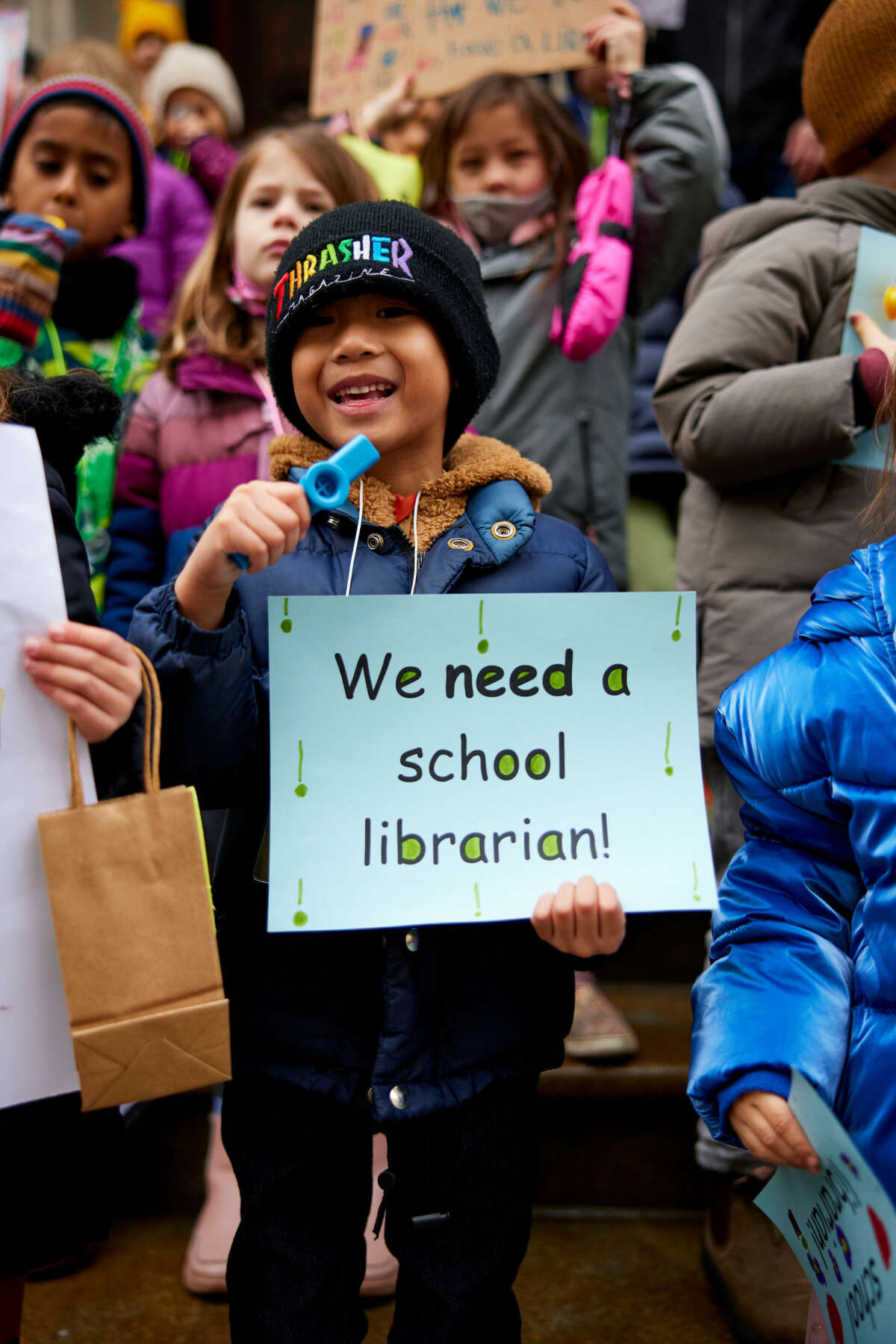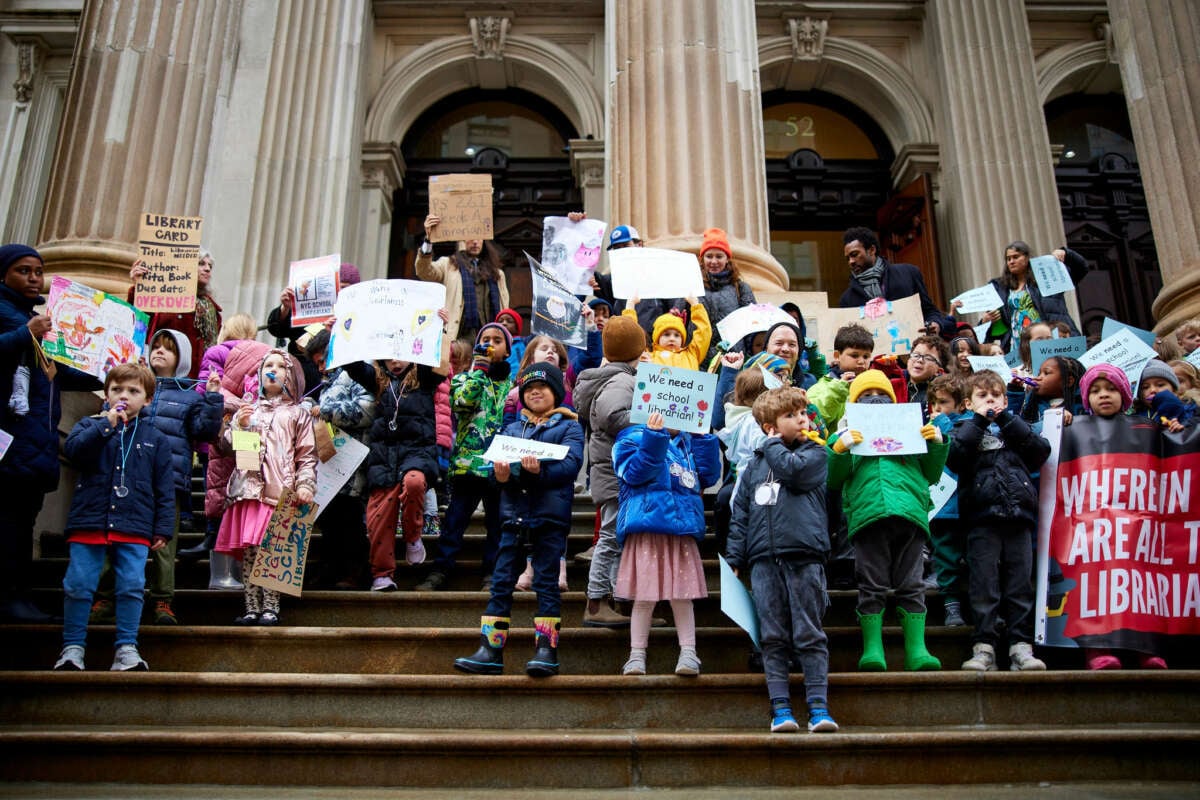On January 12, a group of 60 kindergarten and first grade students and their chaperones assembled on the steps of New York City’s Department of Education (DOE) to demand a school librarian for their building, P.S. 261. They were led by parent and children’s book author Jenny Fox, dressed as fictional villain Carmen Sandiego with a sign asking “Where In New York Are All the School Librarians?”
The student protesters also called for school librarians to be hired at every school in the city that currently lacks one. Despite a Chancellor’s regulation requiring a staffed library in every school in New York City, more than 60 percent of the city’s schools currently lack a certified school librarian, and 40 percent have no library at all.
The rally was the latest action in a campaign that Fox and others have been waging for more than a year. The campaign started after the librarian whom the school hired with PTA funds — a workaround that does not meet the standards of the DOE — resigned for another position, and P.S.261 was again left without a school librarian, and consequently without a functioning school library.
Fox started drawing attention to the situation with a postcard campaign. Students filled out the colorful cards listing their favorite books and why they love reading, and sent them to City Council members Shahana Hanif and Lincoln Restler, Comptroller Brad Lander and Chancellor David Banks. The school collected 400 postcards in a “Magic Mailbox,” and parents donated stamps. In response to the action, council members penned a letter to the DOE asking for data on space and staffing.
Recognizing that a letter will do little on its own, Fox and her team followed up with a petition drive that gathered signatures from more than 1,000 New Yorkers. The petition demanded funding for certified school librarians in every public school in New York City.
They delivered those signatures at the January 12 rally, followed by a meeting with Rita Joseph, chair of the Education Committee, and Lincoln Restler. Melissa Jacobs, director of New York City’s School Library System, and Carolyne Quintana, deputy chancellor of Teaching and Learning, joined the conversation. Everyone agreed that school libraries staffed by certified school librarians are crucial to literacy and to student success. The question now is how to make good on state commitments to providing a school librarian for every learner in every zip code.

What makes this movement all the more urgent is the problem of decreasing literacy rates and increasing racial disparities in the city. Recent reading test scores indicate COVID-era declines in literacy among younger students and widening racial and ethnic disparities: 67 percent of white students passed standardized reading exams compared to 35.8 percent of Black students. While test scores don’t tell the whole story, they point to the need for increased investments in reading instruction, particularly for students of color.
Though the city has responded with promises to reevaluate the reading curriculum to focus on phonics rather than whole-language instruction, school libraries need to be a part of any renewed commitment to increasing literacy in the city.
Research by the American Association of School Librarians convincingly demonstrates that student success increases when children have access to a school library and a certified school librarian. School librarians facilitate interdisciplinary education; develop collaborations between teachers, librarians and parents; support student inquiry; and offer a space and place for students to read independently. And for policy makers interested in quantifiable changes, reading scores increase when students have access to high-quality school libraries.
The New York City school library crisis is not new. The number of school librarians has been dropping since Mayor Michael Bloomberg’s administration. Bloomberg’s “small schools” movement broke large schools into multiple smaller entities, both public and charter, that were then co-located at the same campus. Pitched as a way to expand diverse educational opportunities and offer smaller class sizes, Bloomberg’s plan emerged from the school choice movement and its embrace of charter schools. Granted mayoral control of the city school system, Bloomberg and Chancellor Joel Klein vastly increased the number of city charter schools — which do not pay rent even as they encroach on public space in the city — from a handful to more than 175 schools serving more than 70,000 students. At the same time, many buildings now housed multiple public schools in the same space, drastically increasing the administrative staff in the city’s public education sector. Each of these entities requires its own layer of office staff, from principals to parent coordinators, and each has its own priorities for shared spaces. Along with gymnasiums, auditoriums and cafeterias, libraries are subject to turf wars and are often designated as the space schools can do without. As one school librarian told me, “It takes 20 years to build a library and two days to destroy it.”

The importance of school libraries is gaining legislative traction around the country. New Jersey Gov. Phil Murphy recently signed legislation requiring information literacy instruction in K-12 schools, squarely the domain of school libraries. In Washington State, SB 5102, currently in committee, would establish statewide standards for school libraries. And last year Sen. Jack Reed (D-Rhode Island) and Rep. Raúl Grijalva (D-Arizona) introduced the Right to Read Act, federal legislation that would expand access to school libraries for children across the country. In a political context rife with pushes to ban books and establish parental control over library collections, affirmative legislation is all the more important.
For Fox, whose concerns began with her own children and their reading needs and then expanded to include a growing movement for school libraries in New York City, “School libraries — staffed by certified librarians — are critical to the mental and educational well-being of all of our children.” She continued, “They are a crucial counterpoint to classroom literacy — uniquely profound spaces fostering freedom, self-direction, exploration, and representation.” A school library is a basic need, like art and music and dance, crucial to the life of the city and its people, and worthy of our fight.
Media that fights fascism
Truthout is funded almost entirely by readers — that’s why we can speak truth to power and cut against the mainstream narrative. But independent journalists at Truthout face mounting political repression under Trump.
We rely on your support to survive McCarthyist censorship. Please make a tax-deductible one-time or monthly donation.
